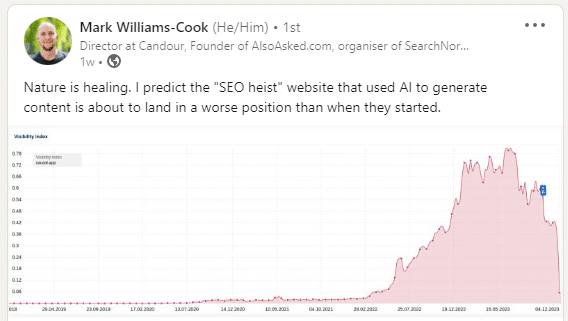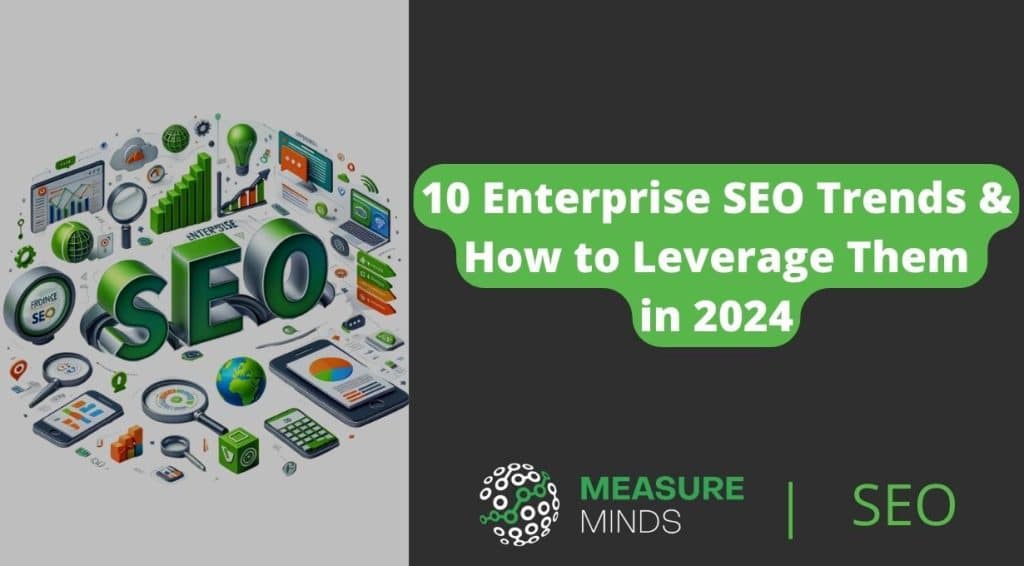
10 Enterprise SEO Trends & How to Leverage Them in 2024
What enterprise SEO trends do you anticipate for 2024, and how would you personally face or take advantage of it? Here is what 10 thought leaders have to say and my personal thoughts to go with them.
- Mobile-first indexing dominates SEO
- AI transforms content generation
- Predictive analysis and automation via AI
- Original data: An SEO cornerstone
- Rise of conversational and voice search
- Fine-tuning content strategies with AI
- Adapting to “PLP” style SERP changes
- User experience emphasised in SEO
- Having to recoup after relying too heavily on AI
- Moving away from Semrush and Ahrefs
Mobile-first indexing dominates SEO
I foresee mobile-first indexing cementing dominance in 2024. With over 60% of searches now on mobile, search engines have responded by prioritising mobile-optimised sites.
My approach with clients involves future-proofing for an increasingly mobile-centric web. For instance, we rebuilt an e-commerce site with a mobile-first mentality – optimising for fast load times, responsive design, and frictionless mobile UX.
Post-launch, mobile traffic rose 41% alongside boosted mobile rankings. This underscores a paradigm shift—mobile optimisation is now the foremost pillar of discoverability. Enterprises must rebuild their foundations to align with this mobile-first future or risk fading into obscurity.
Dennis Jost, Founder and Digital Solutions Expert, Kulana Media Productions LLC
Mobile-first indexing is something that Google have been trying to implement for years. But mobile usage is only going to increase so it’s going to be even more important in 2024.
Google themselves say: While it’s not required to have a mobile version of your pages to have your content included in Google’s Search results, it is very strongly recommended.
You can try to improve your mobile indexability by utilising Google Search Console’s indexing reports to identify any problems. I’d also recommend using Google PageSpeed Insights to test your pages and optimise them for mobile performance.
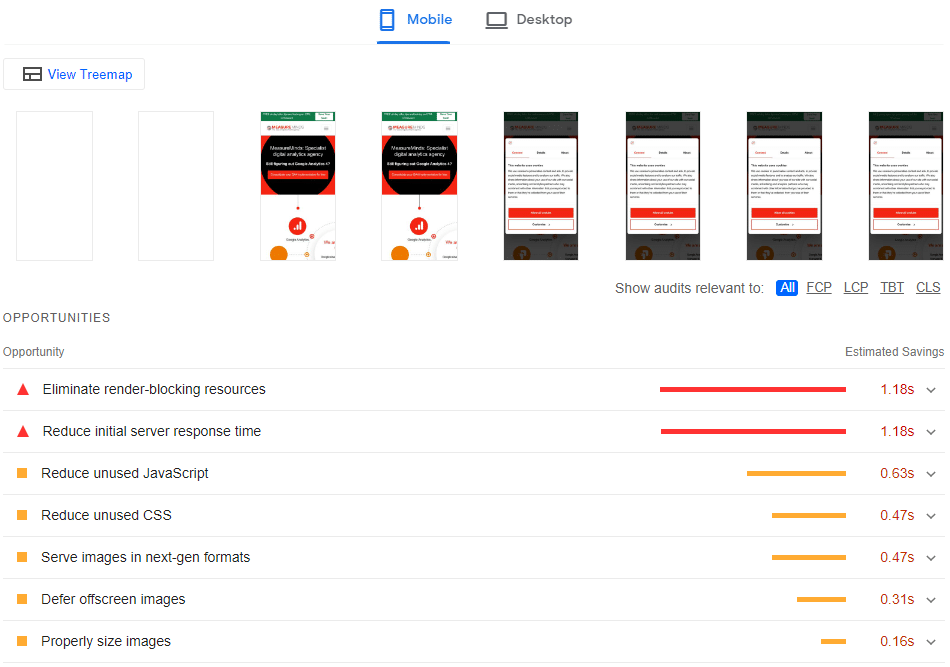
Finally, Google also have an article on mobile-first indexing best practices that you should definitely check out.
AI transforms content generation
Without a doubt, artificial intelligence (AI) is here to stay and will transform not only SEO but also digital marketing as a whole. Auto-generated material has long been disliked by Google, particularly when it’s utilised for spamming or to skew search results.
However, Google is committed to giving its users the greatest possible experience. Things have evolved from the days when AI-generated material was viewed as low quality and of little use.
The most recent iterations of programs like ChatGPT are enabling users to produce some incredibly amazing material. In February 2023, Google clarified in an update to their Search Central policy that “not all use of automation, especially AI era, is spam.”
The employment of AI in writing is now very possible thanks to Google’s softening of its position on the technology, albeit to what degree is still up in the air.
Jeff Romero, Founder, Octiv Digital
There was obviously going to be a lot of AI talk in an enterprise SEO trends for 2024 article. For very good reason, it’s rapidly evolving and very misunderstood.
Whilst I agree with Jeff’s point that programs like ChatGPT are now able to produce great content, I think this content is only useful for explaining something that is already understood by AI.
The problem then becomes Search Generative Experience (SGE)… Anything that is created by AI for your article can be created by AI in the SERPs therefore making your content redundant.
To combat this I think there needs to be more emphasis put on real-life use cases, examples and case studies. Coming up with original and innovative methodologies just isn’t something AI can do. So it’s important to ask real people what they think and include their insights in your article.
AI is still great for enhancing your content or speeding up writing by:
- Generating article brief templates.
- Writing necessary explanations (great for featured snippets).
- Proofreading.
- Adjusting for tone.
- Identifying FAQs
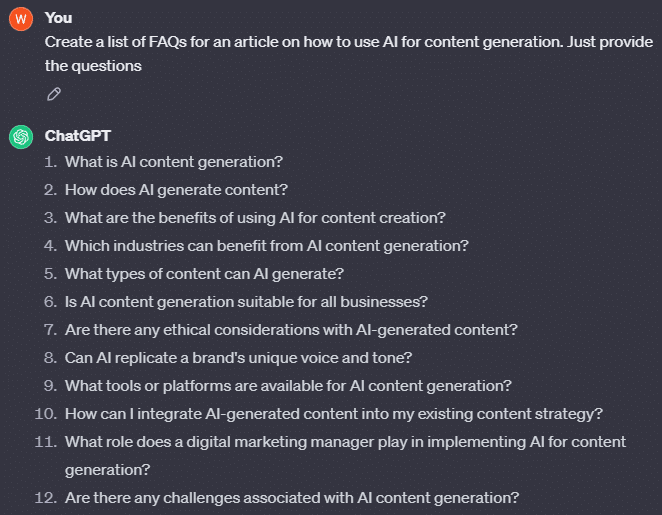
If you don’t utilise AI for copywriting, you’re going to be left behind.
Predictive analysis and automation via AI
Heading into 2024, I’m confident we’ll see a transformative rise in AI utilisation for predictive analysis and automation across enterprise SEO.
AI will become indispensable for decoding user intent and shaping search trends, streamlining content creation to be top-notch and in line with SEO best practices. Considering this, I’m actively guiding several of my enterprise clients through the nuances of AI tools, empowering them to swiftly analyse data and craft standout content with confidence.
As SEO aligns with Google’s growing use of AI to spotlight content that radiates expertise, experience, authoritativeness, and trustworthiness (E-A-T), we’ll see AI-generated content step into the limelight, provided it upholds the highest quality benchmarks. It’s about strategically using AI to enhance, not replace, human expertise in content creation.
Victoria Olsina, SEO Consultant, Speaker, and Comedian, Victoria Olsina Growth Consultancy
Predictive analytics and AI insights are already part of Google Analytics 4 and are useful for a wide range of business use cases, not just SEO. This is only going to get better.
Automation via AI is an enterprise SEO trend that is definitely going to kick off in 2024. I’ve seen some outreach software already utilising ChatGPT to craft immensely personalised outreach messages – even down to whether the target is smiling in their profile picture or not!
This could be integral for building partnerships for content collaborations. An integral part of enterprise SEO.
Original data: An SEO cornerstone
As Google combats the surge of AI-generated content, original data will become a cornerstone of enterprise SEO in 2024. To stand out, I’d focus on creating content with unique insights and proprietary research, positioning it as a primary source that Google values.
This means investing in original studies, user data analysis, and expert opinions that can’t be replicated by AI. By doing so, content would not only rank higher for its authenticity but also become a reference point within the industry, encouraging backlinks and enhancing domain authority.
This strategy ensures that content remains relevant and valuable in an increasingly automated SEO landscape.
Tim Pelletier, Owner and SEO Consultant, Tim Pelletier Consulting, LLC
This is an excellent point and I couldn’t have said this better myself. Be original! Provide real-life use cases that real people can use.
Rise of conversational and voice search
Conversational search is expected to continue its upward trend in 2024, with voice search users seeing results that demonstrate search engines’ understanding of the context of the query, thanks to NLP (Natural Language Processing).
This differs from traditional keyword-based searches, where users input short, fragmented phrases. Conversational search enables a more human-like interaction with search engines. For instance, one might ask, “What is the best-rated smartphone on the market right now?” instead of typing “best smartphones 2024.”
Google’s AI, “Bard,” utilises NLP to generate answers when the search engine is used for typing or voice-searching for information.
To leverage this, I would focus on optimising for long-tail keywords and conversational queries, including the addition of FAQs and structured snippets to web pages.
Melysha Acharya, Ms, Digital Marketing, SEO Consultant, Self-Employed
Great point. Research from Statista predicts that voice assistants will reach 8.4 billion units in 2024. Whilst I do think that is an overestimation, it does speak volumes to the trend of voice search. It’s very useful!
Adding FAQs is great for a number of reasons and enterprises optimising their SEO should definitely be including them whether they’re targeting voice search or not!
My suggestions for finding long-tail, conversational and FAQ keywords is by using People Also Asked, keyword explorers offered by Ahrefs and SEMrush and analysing the SERPs and featured snippets for your target keywords – If someone has the featured snippet, you must include similar information, but better!
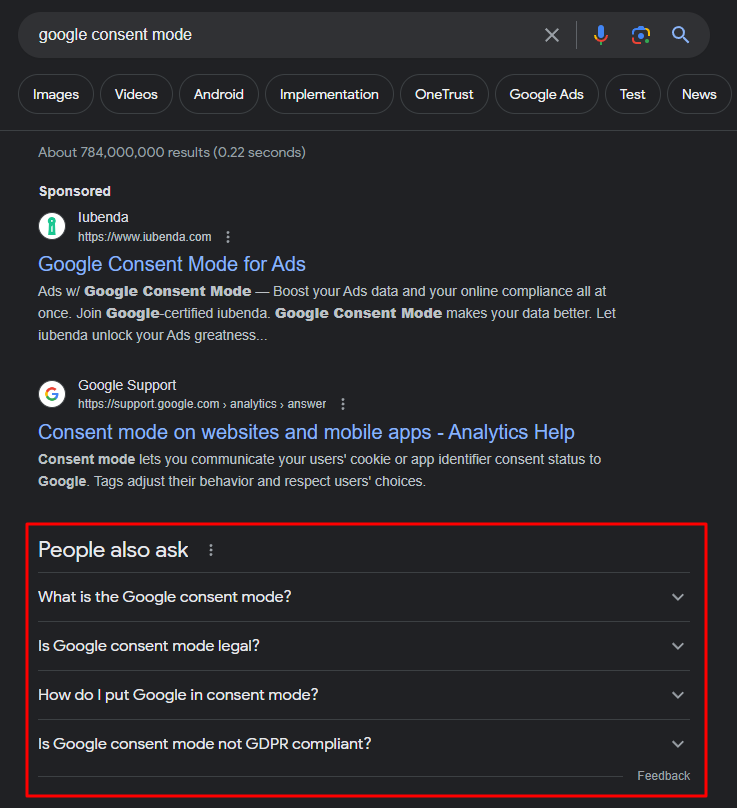
ChatGPT can also be used to come up with lots of FAQs very quickly.
Fine-tuning content strategies with AI
Looking ahead to 2024, I see artificial intelligence shaping up as a game-changer in enterprise SEO. To stay ahead of the curve, I’d dive into the latest AI tools to fine-tune content strategies, making sure every article or page hits the sweet spot between what search engines love and what readers find engaging.
By harnessing AI’s power for crunching data on upcoming search trends and automating the grunt work of keyword research, I can free up more time for creative strategy planning.
Our keyword research process involves fetching the content of the top 5 to 10 search results, extracting the most frequent keywords, including phrases, and consolidating them into a single table ranked by frequency and relevance. Based on this data, we use ChatGPT or Bard to generate new topic suggestions, along with long-tail, and semantic keywords.
Armen Davtyan, Head of SEO, Market Apartments
There will be plenty of ways marketers can use AI to do keyword research and speed things up. The great part about AI is its versatility and I think marketers will get more and more out of AI in 2024 as our prompt engineering gets better.
Adapting to “PLP” style SERP changes
The biggest anticipated change to enterprise SEO, particularly eCommerce and marketplace SEO, is the “PLP (Product Listing Page)” style SERP set to reach Google browsers once the AI Search Generative Experience gets past beta.
This will see organisations quickly trying to adapt to PDP (Product Description Pages) acquisition, an experience that is commonly not indexed in the enterprise space, because of the sheer volume of pages and how quickly they lose value.
It will also shape user behaviour, with users no longer landing on sites to compare the best product but having a higher intent of converting in theory.
Of course, it could also mean users travel out from PDPs onto PLPs in well-structured sites. Either way, the trend we’re likely to see is enterprise SEOs valuing UX data more than they have before as they try to keep up with the evolution that SGE will probably set in motion.
Sally Raymer, SEO Consultant, SEO in Motion
This is a great point. Let me visualise this for you. Here’s what the SERPs look like without SGE:
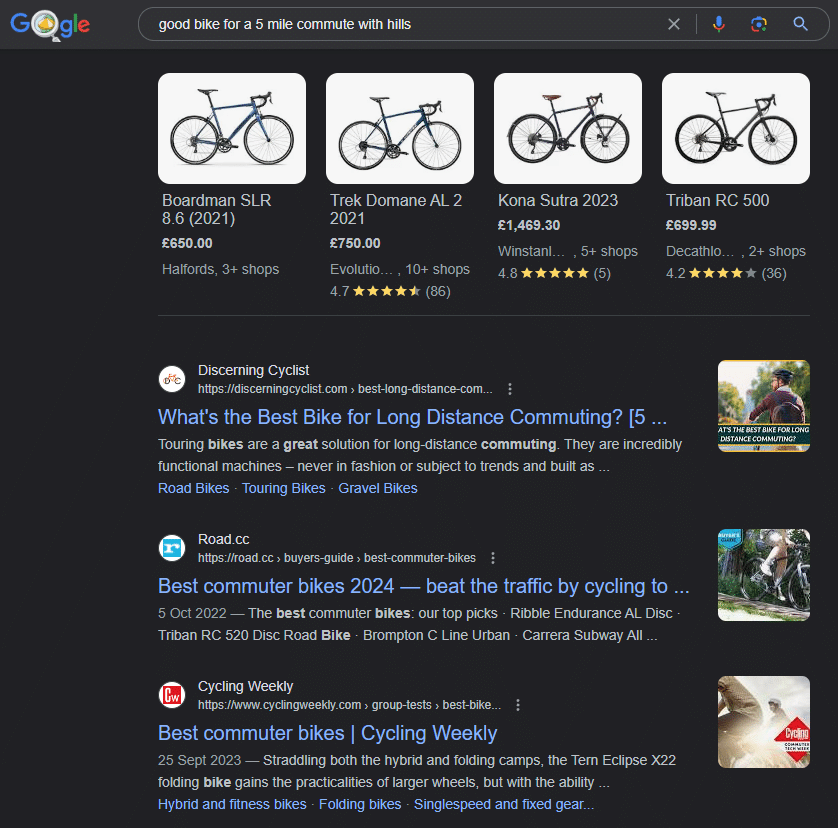
You can see that there are shopping ads at the top and then followed by product listing pages comparing multiple bikes. Those pages will, without doubt, have a short summary of the bikes available on that page at the top and why they’re useful to you.
Here’s what this would look like with SGE.
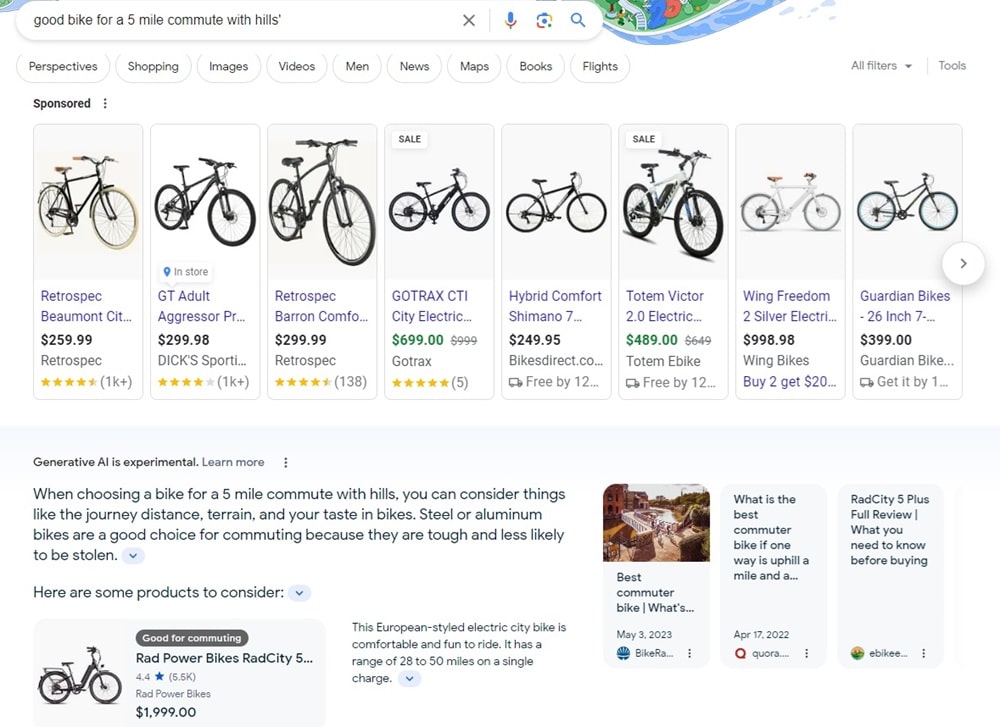
You can see that the Google Shopping ads are still there because that’s how they keep their advertisers happy and how they get money. But you’ll notice below that as you scroll down to the SGE, it mimics a product listing page.
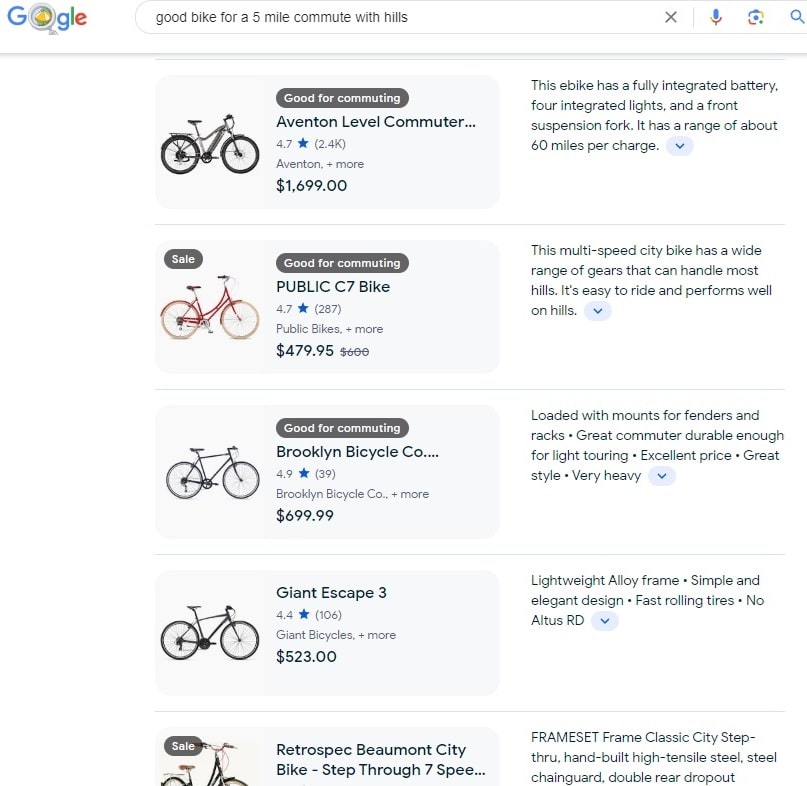
Thanks, Navah Hopkins @ Optmyzr for the images. (We don’t have SGE in the UK yet).
I’m amazed at how extensive the product listings are! I have to scroll down the page to see all the content Google are delivering directly in the SERPs. Therefore, as Sally said, it’s going to be critical to:
- Ensure your PDPs are indexed and highly optimised.
- Creating a more navigable site with a focus on UX to bring customers from PDPs into other pages of their site (PLPs).
User experience emphasised in SEO
One trend in enterprise SEO that I expect to grow significantly in 2024 is the increasing emphasis on user experience. Search engines aim to serve users the most relevant and high-quality content possible. However, relevance is no longer solely about keywords and backlinks; it’s also about how users interact with a site.
Enterprises should double down on technical SEO as a starting point. This involves optimising the technical elements of a website to improve page speed and ensure the site is accessible and easily organised by search engines. My approach would be multifaceted.
First, creating an experience tailored to smaller screens would meet the ever-increasing prevalence of mobile browsing.
Second, I’d ensure the website content meets user intent. This starts with aligning keyword research with the intent of the searches, not just search volume.
Then, move on to creating content that provides solutions. Website content should answer users’ questions.
George Cotter, SEO Consultant, Tall Marketing
George is right, user experience is becoming more and more of an important ranking factor for search engines. And a lot of this does come down to ensuring that your site is technically well set up, your content matches user intent and is genuinely helpful. Much to Tim’s point earlier – this will mean incorporating original, real-life use cases and research.
I would be careful of optimising for mobile browsing… Whilst mobile browsing is continuing to grow – in some industries it just isn’t. I urge you to find out which device users use to access your site, before optimising any one device.
As for ensuring the technical SEO of your enterprise site, we have a 21-step written guide on how to do an SEO audit.
Having to recoup after relying too heavily on AI
companies are putting way too much faith into AI content creation tools. Especially when they think they can remove human involvement from the editing process. We even saw this recently with the “SEO heist” case study where someone created 1,000s of AI-generated articles based on a competitor’s sitemap. The website was hit with a manual penalty and now is in a worse position than when they began.
But if you’re regretting publishing AI content, don’t worry. You can fix this by doing a full content audit. Meaning finding content that’s considered “spam” and fixing it to remove the penalty.
You’ll likely want to use Google Search Console for this to find pages that were never getting traffic or impressions prior to the manual penalty. Ideally, look at the last 16 months of data to find zombie pages and then audit your content based on your findings. Normally these zombie pages are either low quality, cannibalizing other pages, or just not relevant to the searchers intent.
From this, you want to review each page and see if it’s genuinely helpful to the reader. Does it still have potential? Great then update it! Is it cannibalizing another article? Merge your content into that existing piece. Is your content just low-quality without any search potential? Just delete it.
While there’s nothing inherently wrong about using AI content, you want to be cautious with what you’re creating. If you’re pushing out thousands of articles without any human review, then you’re bound to end up like that case study.
Taylor Scher, SEO Consultant, TaylorscherSEO
The great “SEO heist” is perhaps the best demonstration that mindlessly publishing thousands of words of AI drivel will not prove successful in the long-run. Much to Tim’s point earlier, content needs to be genuinely helpful and actionable with original research, data and real use cases. AI content just can’t do this yet.
Sadly a lot of companies will have gone down this route and will now be realising the consequences. It does mean that there might be some extra work out there for agencies and consultants. Poaching AI article-writing software clients could actually be a good sales tactic.
Moving away from Semrush & Ahrefs
I’m going to submit the tenth enterprise SEO trend after Ahrefs recent change to their pricing structure. The change has seen a lot of backlash from the SEO crowd, including me.
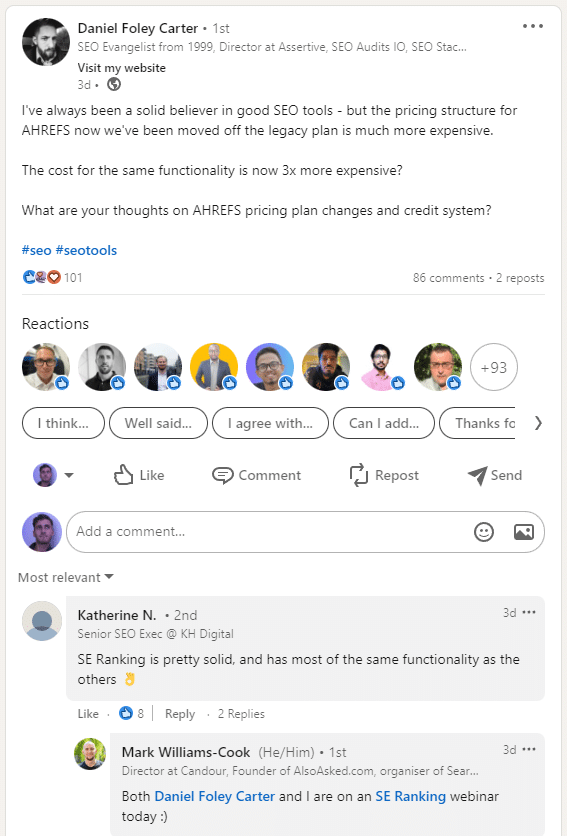
Let me try to help you understand how expensive it has gotten. For every site you search for, that’s one credit, for every keyword you search for, that’s one credit, applying ANY filter will charge an additional credit.
What makes it even worse is that if you go back to the same thing you were looking at earlier, but more than 30 minutes later, you will be charged an additional credit.
Any SEO or Ahrefs user will understand how quickly you would burn through 500 credits, which is their cheapest plan at £79 per month.
They also have this strange new threshold which determines what kind of user you are. People who use Ahrefs more get charged a much higher rate per additional credit they buy. Which just doesn’t make sense to me.
As enterprises will typically be heavier users, this means that Ahrefs is going to get expensive pretty fast. Some people have said that they hit their credit limit of 500 in two days. After that point you switch to their incredibly over-priced pay-as-you-go credit system.
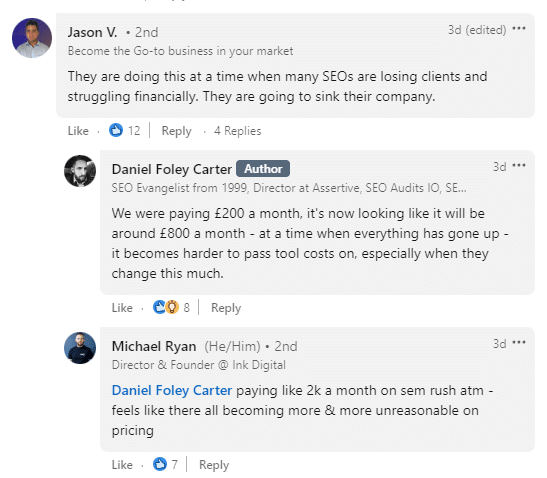
More tools are coming out and existing tools are improving vastly. I predict a lot of people will start to choose different SEO tools in 2024.
- How to Blend GA4 & UA Data Using BigQuery & Looker Studio - 12/07/2024
- How to do a Google Analytics 4 Audit & Mistakes to Avoid - 10/07/2024
- How to Backup & Visualize GA3 Data for Free - 27/06/2024






